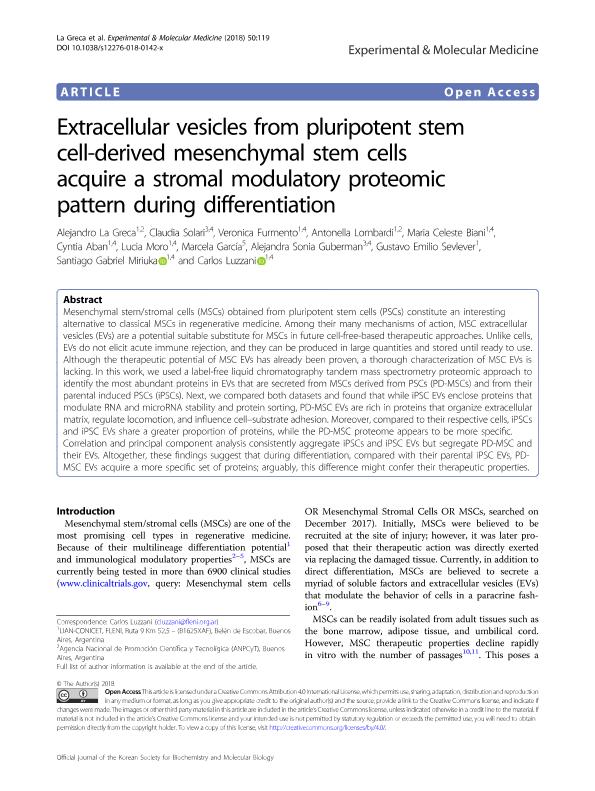Artículo
Extracellular vesicles from pluripotent stem cell-derived mesenchymal stem cells acquire a stromal modulatory proteomic pattern during differentiation
la Greca, Alejandro Damián ; Solari, Claudia María
; Solari, Claudia María ; Furmento, Verónica Alejandra
; Furmento, Verónica Alejandra ; Lombardi, Antonella; Biani, María Celeste
; Lombardi, Antonella; Biani, María Celeste ; Aban, Cyntia Estefania
; Aban, Cyntia Estefania ; Moro, Lucía Natalia
; Moro, Lucía Natalia ; García, Marcela; Guberman, Alejandra Sonia
; García, Marcela; Guberman, Alejandra Sonia ; Sevlever, Gustavo; Miriuka, Santiago Gabriel
; Sevlever, Gustavo; Miriuka, Santiago Gabriel ; Luzzani, Carlos Daniel
; Luzzani, Carlos Daniel
 ; Solari, Claudia María
; Solari, Claudia María ; Furmento, Verónica Alejandra
; Furmento, Verónica Alejandra ; Lombardi, Antonella; Biani, María Celeste
; Lombardi, Antonella; Biani, María Celeste ; Aban, Cyntia Estefania
; Aban, Cyntia Estefania ; Moro, Lucía Natalia
; Moro, Lucía Natalia ; García, Marcela; Guberman, Alejandra Sonia
; García, Marcela; Guberman, Alejandra Sonia ; Sevlever, Gustavo; Miriuka, Santiago Gabriel
; Sevlever, Gustavo; Miriuka, Santiago Gabriel ; Luzzani, Carlos Daniel
; Luzzani, Carlos Daniel
Fecha de publicación:
09/2018
Editorial:
Nature Publishing Group
Revista:
Experimental And Molecular Medicine Emm
ISSN:
1226-3613
Idioma:
Inglés
Tipo de recurso:
Artículo publicado
Clasificación temática:
Resumen
Mesenchymal stem/stromal cells (MSCs) obtained from pluripotent stem cells (PSCs) constitute an interesting alternative to classical MSCs in regenerative medicine. Among their many mechanisms of action, MSC extracellular vesicles (EVs) are a potential suitable substitute for MSCs in future cell-free-based therapeutic approaches. Unlike cells, EVs do not elicit acute immune rejection, and they can be produced in large quantities and stored until ready to use. Although the therapeutic potential of MSC EVs has already been proven, a thorough characterization of MSC EVs is lacking. In this work, we used a label-free liquid chromatography tandem mass spectrometry proteomic approach to identify the most abundant proteins in EVs that are secreted from MSCs derived from PSCs (PD-MSCs) and from their parental induced PSCs (iPSCs). Next, we compared both datasets and found that while iPSC EVs enclose proteins that modulate RNA and microRNA stability and protein sorting, PD-MSC EVs are rich in proteins that organize extracellular matrix, regulate locomotion, and influence cell–substrate adhesion. Moreover, compared to their respective cells, iPSCs and iPSC EVs share a greater proportion of proteins, while the PD-MSC proteome appears to be more specific. Correlation and principal component analysis consistently aggregate iPSCs and iPSC EVs but segregate PD-MSC and their EVs. Altogether, these findings suggest that during differentiation, compared with their parental iPSC EVs, PD-MSC EVs acquire a more specific set of proteins; arguably, this difference might confer their therapeutic properties.
Palabras clave:
EXTRACELLULAR VESICLES
,
MESENCHYMAL STEM CELLS
,
PROTEOMIC
,
DIFFERENTIATION
Archivos asociados
Licencia
Identificadores
Colecciones
Articulos(IQUIBICEN)
Articulos de INSTITUTO DE QUIMICA BIOLOGICA DE LA FACULTAD DE CS. EXACTAS Y NATURALES
Articulos de INSTITUTO DE QUIMICA BIOLOGICA DE LA FACULTAD DE CS. EXACTAS Y NATURALES
Articulos(SEDE CENTRAL)
Articulos de SEDE CENTRAL
Articulos de SEDE CENTRAL
Citación
la Greca, Alejandro Damián; Solari, Claudia María; Furmento, Verónica Alejandra; Lombardi, Antonella; Biani, María Celeste; et al.; Extracellular vesicles from pluripotent stem cell-derived mesenchymal stem cells acquire a stromal modulatory proteomic pattern during differentiation; Nature Publishing Group; Experimental And Molecular Medicine Emm; 50; 119; 9-2018; 1-12
Compartir
Altmétricas



